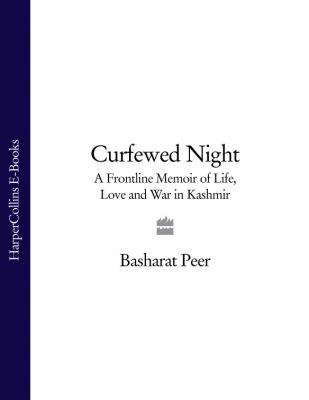Curfewed Night: A Frontline Memoir of Life, Love and War in Kashmir. Basharat Peer
Читать онлайн.| Название | Curfewed Night: A Frontline Memoir of Life, Love and War in Kashmir |
|---|---|
| Автор произведения | Basharat Peer |
| Жанр | Историческая литература |
| Серия | |
| Издательство | Историческая литература |
| Год выпуска | 0 |
| isbn | 9780007356430 |
CURFEWED NIGHT
A Frontline Memoir of Life, Love
and War in Kashmir
BASHARAT PEER
Harper
Press
In the memory of the boys who couldn’t return home
For Baba and for my parents, Hameeda Parveen and G. A. Peer
Contents
14 - In the Courtyards of Faith
People are trapped in history and history is trapped in people.
—Notes of a Native Son, James Baldwin
The city from where no news can come is now so visible in its curfewed night that the worst is precise:
From Zero Bridge a shadow chased by searchlights is running away to find its body.
—The Country Without a Post Office, Agha Shahid Ali
I was born in winter in Kashmir. My village in the southern district of Anantnag sat on the wedge of a mountain range. Paddy fields, green in early summer and golden by autumn, surrounded the cluster of mud-and-brick houses. In winter, snow slid slowly from our roof and fell on our lawns with a thud. My younger brother and I made snowmen using pieces of charcoal for their eyes. And when our mother was busy with some household chore and Grandfather was away, we rushed to the roof, broke icicles off it, mixed them with a concoction of milk and sugar stolen from the kitchen, and ate our homemade ice creams. We would often slide down the slope of the hill overlooking our neighborhood or play cricket on the frozen waters of a pond. We risked being scolded or beaten by Grandfather, the school headmaster. And if he passed by our winter cricket pitch, he expressed his preference of textbooks over cricket through his dreaded shout: “You good-for-nothings!” At his familiar bark, the cricket players would scatter in all directions and disappear. School headmasters were feared like military and paramilitary men are, not just by their grandchildren but by every single child in the village.
On winter afternoons, Grandfather joined the men of our neighborhood sitting at the storefronts warming themselves with kangris, our mobile fire pots, gossiping or talking about how that year’s snowfall would affect the mustard crop in the spring. After the muezzin gave the call for afternoon prayers, they left the shop fronts, fed the cattle at home, prayed at the neighborhood mosque, and returned to the storefronts to talk.
Spring was the season of green mountains and meadows, blushing snow and the expanse of yellow mustard flowers in the fields around our village. On Radio Kashmir, they played songs in Kashmiri celebrating the flowers in the meadows and the nightingales on willow branches. My favorite song ended with the refrain: “And the nightingale sings to the flowers: Our land is a garden!” When we had to harvest a crop, our neighbors and friends would send someone to help; when it was their turn, we would reciprocate. You never needed to make a formal request weeks in advance. Somebody always turned up.
During the farming season, Akhoon, the mullah who refused to believe that Neil Armstrong had landed on the moon, complained about the thinning attendance at our neighborhood mosque. I struggled to hold back my laughter when the villagers eager to get back to farming coughed during the prayers to make him finish faster. He compromised by reading shorter chapters from the Quran. Later in the day he would turn up at the fields to collect a seasonal donation—his fee for leading the prayers at the mosque.
In summer, after the mustard was reaped, we planted rice seedlings. On weekdays before we left for school, my brother and I took samovars of kahwa, the sweet brew of saffron, almonds, and cinnamon, to the laborers working in our fields. On weekends, I would help carry sacks of seedlings from the nurseries; Mother, my aunts, and other neighborhood women bent in rows in the well-watered fields, planted, and sang.
Grandfather kept an eye on a farmer whose holdings bordered our farms. We would see him walking toward the fields, and Grandfather would turn to me: “So, whom do you see?” “I see Mongoose,” I would reply. And we would laugh. A short, wiry man with a wrinkled face, Mongoose specialized in things that led to arguments—diverting water to his fields
